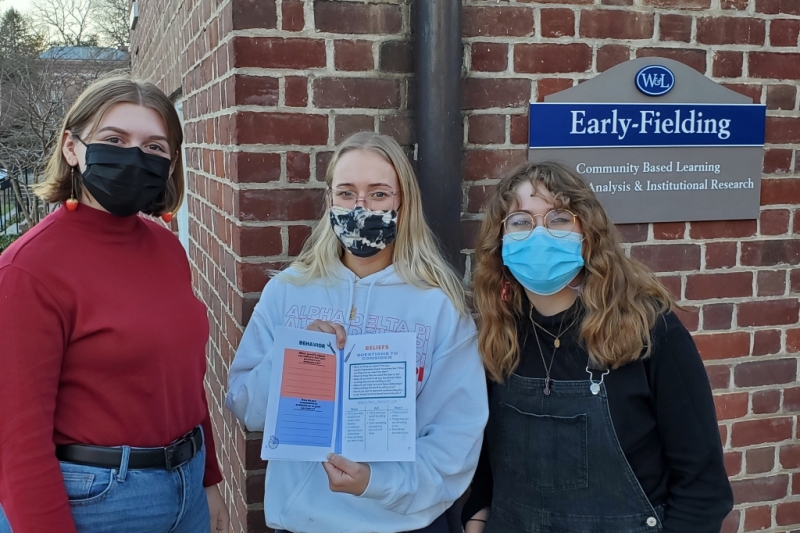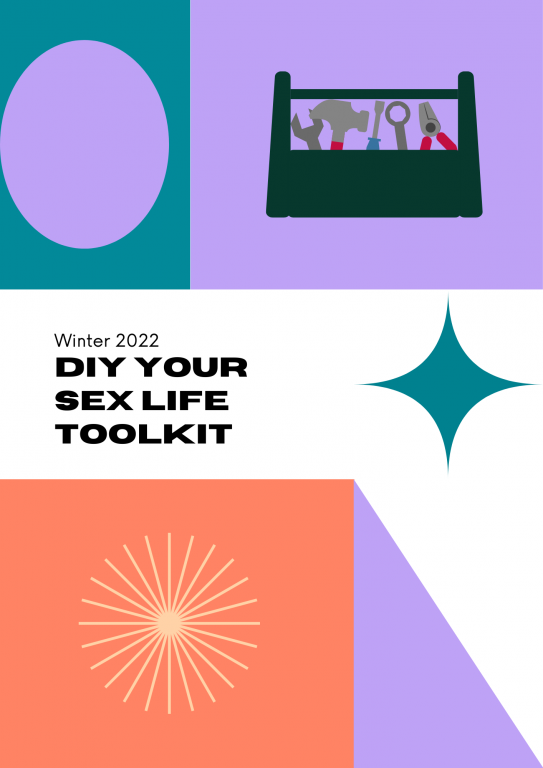Students Create Positive Sexual Culture Workshop As part of a community-based learning class in the Sociology and Anthropology Department, students worked with community partners to create a workshop about positive sexual culture for first-year students.
First-year college students experience culture shock in many ways, and one of them is finding their sexual identity and building safe relationships. As a response, a sociology and anthropology class at W&L educated themselves about sexual culture and learned how to teach others about positive sexual culture in a community-based learning (CBL) class that partnered with Student Health and Counseling and Project Horizon.
Students in the Fall 2021 class, Gender and Sexuality, which was taught by Professor Sascha Goluboff, created a module workshop for fellow W&L students in collaboration with Mikhala Stafford, campus services coordinator at Project Horizon, and Jan Kaufman and Janet Boller from W&L Student Health and Counseling. The workshop features a DIY Your Sex Life Toolkit workbook and presentation that encourages students to consider various topics on sex-positive culture, such as what healthy sexuality means to them, what healthy consent looks like and how to set comfortable boundaries.
Audrey Blumenstock ’22, an international politics major, said the class decided to design the workshop for first-year students “because we think that going in [to college], it’s an uneven playing field for students in terms of education regarding sexuality, sexual health and healthy sexual relationships.”
To create the workshop, students learned about hookup culture and pressing gender and sexuality issues in the community. Working with Project Horizon, a nonprofit dedicated to eradicating domestic, sexual and dating violence through the empowerment of survivors, was important to the students. “Being able to understand the community side of sexual issues was something that I think helped me a lot when thinking about the greater Rockbridge area and the needs of the community outside of W&L,” Blumenstock said.
Emma Smith ’24, a cognitive and behavioral science major and women, gender, and sexuality studies minor, said seeing the work Project Horizon does and Lexington’s problem areas put the project into perspective.
“The amount of projects Project Horizon helps with as well as W&L students specifically, and the level of anonymity that they can bring is just incredible,” Smith said. “We implemented that information into our module and made students aware of how big a resource Project Horizon is because a lot of students don’t know about it.”
To begin creating the module, students split into groups to research and create a workshop proposal. After presenting all proposals to community partners, they combined elements from each proposal to create the workshop model. That was later presented to community partners and further edited based on their feedback.
The discussion-based format of the course helped students to process class readings, learn from each other and community partners, and create the module. Catherine Hudson ’24, a women, gender, and sexuality studies minor, said it was one of the highlights of the course.
“I just loved learning about everyone’s different perspectives because we had such a variety of people in the course,” she said. “We had international students, Greek life representation, independents … everyone had different levels of experience with the topic.”
Many students felt comfortable having discussions and talking about their personal experiences. “It was great to be in an academic setting and talk with my peers,” Blumenstock said. “I learned so much that challenged what I thought I already knew. The course expanded my horizons as to the depth of gender and sexuality at its core.”
Smith recalls how class discussions inspired the module workshop.
“When one person makes that first step and opens up and finally talks about something, then it is revealed that everyone else has very similar experiences. You think, ‘Why isn’t everyone talking about this?’ Which is what [our class] wanted the module itself to be…to start those conversations and those reflections.”
The end goal of the module is to demystify hookup culture and encourage conversation regarding sexual health. Hudson believes the first step is to “inspire different people from different areas to really care. I think that one of the main ways of changing culture is having honest conversations about sex and gender, and all those things that feed into this culture that perpetuates gender stereotypes or toxic behaviors that are embedded in hookup culture. This will hopefully start to make small incremental changes to people’s behaviors in their daily lives.”
Choosing this course was very intentional for students. Hudson wanted to get involved in making a difference.
“I liked that it was going to be a community-based learning class because we are so young, we don’t have a lot of opportunities to really make an impact in the community. Coming up with a product and talking to important people in the university was just really appealing and really cool, and gender and sexuality is something that I feel maybe isn’t talked about enough or dealt with enough. The idea of getting involved in the community in that way is just so exciting to me.”
Blumenstock is not new to tackling this issue outside the classroom.
“I did work with the school administration on sexual misconduct prevention awareness programming for first-year students as well as a gender-specific training for Greek Life organizations. After already putting in some changes to our current programming, I thought that taking an academic class focusing on it would be a really good way of expanding my own ideas and push back on some opinions I have.”
Smith said the class had a personal impact on her. “As a queer person in the class, I was very ready to talk about my own experiences because they aren’t discussed enough at W&L. A lot of queer people are afraid of coming out at W&L, and we’re afraid of talking about it, especially in a class setting. But because we had such a comfortable class setting and it was very inclusive and supportive, I think it prepared me to share more in the classroom and perhaps even in less-inclusive environments.”
At the end of the course, the class presented the module workshop to community partners and Jason Rodocker, associate dean of students. The module is being adapted for a Greek Life orientation, and students from SOAN: Gender and Sexuality have offered to facilitate the workshop going forward.
Students can take CBL-designated courses throughout different disciplines on campus and have hands-on experience in the community. Interested students should look out for future CBL courses by checking out CBL’s website or searching for the CBL designation when choosing courses.
 Students in Professor Sascha Goluboff’s class, Gender and Sexuality, hold a workbook they created for first-year students about positive sexual culture.
Students in Professor Sascha Goluboff’s class, Gender and Sexuality, hold a workbook they created for first-year students about positive sexual culture. The cover of a workbook about healthy sexual culture created in a community-based learning class on Gender and Sexuality.
The cover of a workbook about healthy sexual culture created in a community-based learning class on Gender and Sexuality.
You must be logged in to post a comment.